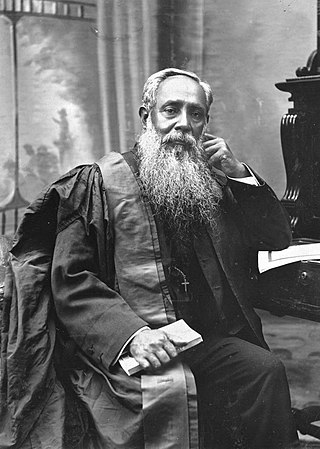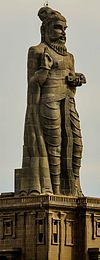
The Central Institute of Classical Tamil (CICT) is a body established by the Government of India with a view to promoting the cause of Classical Tamil. It is located in Chennai.
Tirukkural, also known as the Kural, an ancient Indian treatise on the ethics and morality of the commoner, is one of the most widely translated non-religious works in the world. Authored by the ancient Tamil poet-philosopher Thiruvalluvar, it has been translated into at least 42 world languages, with about 57 different renderings in the English language alone.

John Lazarus (1845–1925) was a Christian missionary to India who rendered the Tirukkural into English. He revised the work of his predecessor William Henry Drew, who had already translated the first 63 chapters of the Tirukkural, and translated the remaining portion of the Kural text.

Tirukkural remains one of the most widely translated non-religious works in the world. As of 2014, there were at least 57 versions available in the English language alone. English, thus, continues to remain the language with most number of translations available of the Kural text.
Hindi perhaps has many translations of the Tirukkural. As of 2000, there were at least 19 translations of the Kural text available in Hindi. Many of these translations are in verse form.
Kannada has at least eight translations of the Tirukkural available as of 2014. Both prose and verse translations have been made in Kannada.
Telugu is one of the Indian languages that has had the earliest Tirukkural translations in modern times. As of 2000, there were at least 14 translations of the Kural text available in Telugu.
As of 2015, there were at least three Gujarati translations available of the Tirukkural.
As of 2015, Tirukkural has been translated into Punjabi at least twice.
Herbert Arthur Popley was a Christian missionary of London Mission, Erode, known for his literary work as a translator of the Tirukkural and his skill in rendering Tamil Christian music in the Carnatic style. He was secretary of the All-India Y.M.C.A. At the time of his death, he was president of the local Y.M.C.A. and a director of the Coonoor Co-operative Urban Bank Ltd. He died in Coonoor on 9 May 1960 at the age of 81.
S. M. Michael was one of the early 20th-century translators of the Tirukkural into English.
A. Chakravarti, who served the Indian Educational Service (IES), was a professor of philosophy at the Presidency College in Chennai, India. He is known for translating the Tirukkural into English.
G. Vanmikanathan, better known as G. V. Pillai, was a Tamil scholar, author, founder and organiser of the 'Tirukkural Prachar Sangh'. He is known for translating the Tirukkural into English.
P. S. Sundaram (1910–1998), born Pazmarneri Subrahmanya Sundaram, was an Indian professor of English, best known for translating the Tirukkural and various Tamil classics into English. He had degrees in English from the University of Madras and the Oxford University. He served as professor of English for about 40 years in different parts of North India.
E. S. Ariel, also referred to as Monsieur Ariel by his contemporaries, was a 19th-century French translator known for his French translation of the ancient Indian philosophical text of the Tirukkural. He translated select couplets of the Tirukkural into French in 1848 and published it in Paris under the title Kural de Thiruvalluvar . Although the first French translation of the Kural text was made by an unknown author in 1767, which Ariel had mentioned in his work, it was Ariel's translation that brought the ancient work to the French world.
Shuzo Matsunaga is a Japanese engineer best known for translating the Kural into Japanese from its English version.

P. C. Kokila is an Indian professor of Hindi, who is best known for translating the Tirukkural into Gujarati.
Soibam Rebika Devi is an Indian translator who is best known for translating the Tirukkural into Meitei.
S. Srinivasan is an Indian civil engineer, who is best known for translating the Tirukkural into Kannada.
The dating of the Tirukkural, and by extension the period of its author Valluvar, has been a subject of intense debate among scholars for centuries, and it continues to remain so. The Kural is variously dated between 300 BCE and 5th century CE. According to Blackburn, the "current scholarly consensus" dates the text and the author to approximately 500 CE. The Tamil Nadu government has ratified 31 BCE as the year of birth of Valluvar. Still the precise date as to when Valluvar completed writing the Kural text remains murky. This article speaks about various dates arrived at by various scholars over time.




